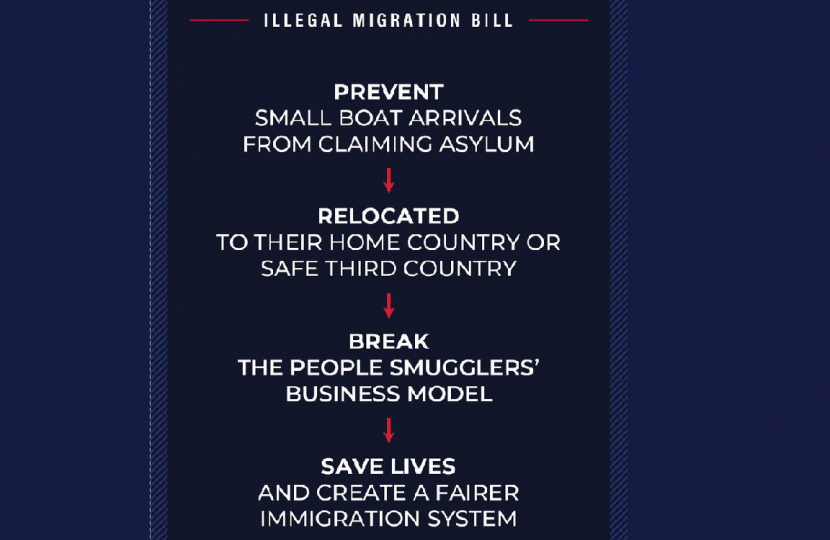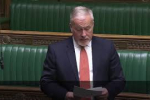
Earlier this year the Prime Minister made stopping the boats one of his 5 promises to the British people. This week, the Home Secretary announced that the Illegal Migration Bill will fulfil that promise by ending illegal entry as a route to asylum in the UK.
Commenting, Richard Fuller MP said:
This Bill will remove the incentive for people to risk their lives through these dangerous and unnecessary journeys and pull the rug from under the criminal gangs profiting from this misery once and for all.
We are rightly recognised as a tolerant nation with a strong record of hospitality towards those suffering persecution in their own country.
As MP I have met countless local families that have opened their homes recently to families and worked with many groups that promote our responsibilities toward refugees. Our actions recently in relation to Ukraine, Afghanistan and Hong Kong are testament to those values.
However, i believe we have to recognise that our asylum processes have not adequately kept pace with changes in migration patterns, the global attractiveness of the U.K. as an ultimate destination or with the human exploitation of the criminal gangs that prey on people’s hopes and fears.
After a decade of clearing up the backlog of standard citizenship applications left by Labour, the Home Office has not applied enough resources to asylum applications. The legal framework tends to work against, rather than with, the grain of an ineffective processing system. As a result we are left in a clearly unsustainable position.
Taxpayers should not be funding hotel rooms for asylum seekers at a weekly cost of £50 million and which add to pressures on primary care and school places.
People traffickers should not be left to profit to the tune of millions of pounds whilst every day risking human tragedy in the English Channel.
Our “safe and legal” routes should not remain constrained to such a limited number of countries.
So I welcome the government's initiative this week to address the small boats crisis. The detail of the new Bill will need scrutiny and in doing so I will want to ensure we maintain the highest possible standards of support (legal, medical etc) to make sure that all legitimate applications can be heard.
The new legislation can bring about some significant change but we also need to improve cooperation with France, to encourage our legal professionals to see the new process as legitimate and fair, and to work internationally to update refugee conventions and laws so they meet the challenges of this century.
I believe the Prime Minister is committed to making progress on all these fronts and I will support him in these endeavours.
The Bill will mean anyone who enters the UK illegally and who has passed through a safe country will be legally required to be removed and the Home Secretary will have the power to enforce it. Migrants may be detained for 28 days with no recourse for bail or judicial review, and then for as long as there is a reasonable prospect of removal.
In exceptional circumstances if there is a risk that someone would suffer a real risk of serious and irreversible harm when they are relocated to that specific safe third country, they would not be removed until it was safe to do so. Even in these cases you will have a maximum 45 days to remain in the UK before your appeal is exhausted.
The annual number settled via safe and legal routes will be kept under review, and if there is a humanitarian crisis within the world that requires a response, then the UK will step up and offer sanctuary to those in need, as we have done for tens of thousands of Ukrainians and Afghans.
Below is a summary of the Bill's measures:
- Duty to make arrangements for removal - the Home Secretary will have a legal duty to remove people who have entered the UK illegally.
- Detention and bail - strengthening detention powers so people can only apply for bail from the Courts (First-tier Tribunal) after 28 days (although habeus corpus will remain).
- Unaccompanied children - minors who come to the UK illegally will not be removed to a safe third country until adulthood, except in limited circumstances.
- Entry, citizenship and settlement - people who come to the UK illegally will be prevented from settling in the country and will face a permanent ban from returning.
- Asylum - people who come here illegally will have their asylum claims deemed inadmissible and considered in a safe third country.
- Modern slavery - modern slavery referrals for those who come to the UK illegally will be disqualified under public order grounds under the terms of the international anti-trafficking treaty, ECAT.
- Legal proceedings - limiting the circumstances in which legal challenges will prevent someone from being removed from the UK. Most legal challenges will be considered when someone has been successfully removed from the UK.
- Expanding the list of countries that are considered safe in law - this will make it unquestionably clear when someone doesn’t need our protection because they are obviously not at risk of persecution in their home country.
- Annual number of people using safe and legal routes - committing to resettling a specific number of refugees in the UK every year.
These measures are in addition to the deal the Prime Minister secured with President Macron on Friday to establish a new detention centre in France, the deployment of more French personnel, and enhanced technology to patrol beaches in a shared effort to drive down illegal migration. This enhanced cooperation aims to increase the interception rate for attempted crossings and drastically reduce the number of crossings each year.
The new detention centre will support French efforts to increase detention capacity, allowing more migrants who might otherwise travel by dangerous and illegal routes to the UK to be removed from the French coast.
Hundreds of extra French law enforcement officers will use enhanced technology and intelligence insight to prevent illegal Channel crossings. This will more than double the number of personnel deployed in northern France to tackle small boats, with over half of these in place by the end of the year. This agreement for three years, builds on joint measures taken with France in 2022, which increased patrols by 40 per cent.
Efforts will be bolstered by a new, highly trained, permanent French mobile policing unit dedicated to tackling small boats. Additional drones, aircraft and other technologies like surveillance will also be deployed, as the UK and France step up intelligence sharing to clamp down on people trafficking routes.
A new 24/7 zonal coordination centre, with permanent UK liaison officers, will bring all relevant French law enforcement partners together for the first time to coordinate the response, building on our existing joint work with France, which prevented nearly 33,000 Channel crossings in 2022.

